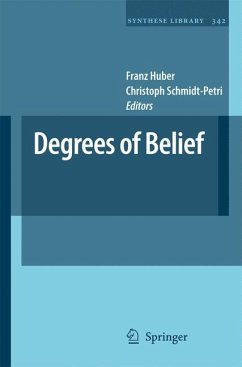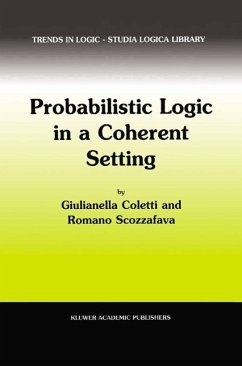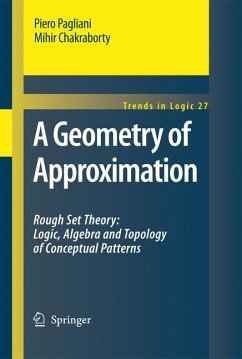
eBook, PDF
Degrees of Belief (eBook, PDF)

PAYBACK Punkte
36 °P sammeln!






. . . . . . . . . . . . . . . . .
Dieser Download kann aus rechtlichen Gründen nur mit Rechnungsadresse in A, B, BG, CY, CZ, D, DK, EW, E, FIN, F, GR, HR, H, IRL, I, LT, L, LR, M, NL, PL, P, R, S, SLO, SK ausgeliefert werden.
Christoph Schmidt-Petri has been awarded a PhD in Philosophy from the London School of Economics in 2005, where he also held a pre-doctoral Jacobsen Fellowship. He has been a member of the Philosophy, Probability and Modeling Group at the University of Konstanz, the Faculty of Economics at Witten/Herdecke University, and the Departments of Philosophy at the Universities of Glasgow, Saarbrücken and Leipzig. From 2002 till 2008, he has been Managing Editor of Economics and Philosophy. He has published articles in journals such as The Philosophical Quarterly, Philosophy of Science, Analyse & Kritik, and is the editor of several other books in political philosophy and the philosophy of the social sciences. Franz Huber received his PhD from the University of Erfurt in 2003. From 2002 to 2005 he was postdoctoral researcher in the Philosophy, Probability, and Modeling group at the University of Konstanz. From 2005 to 2007 he was Ahmanson postdoctoral instructor at the California Institute of Technology and then visiting researcher at the Department of Logic and Philosophy of Science at UC Irvine. Since 2008 he is director of the Formal Epistemology Research Group at the University of Konstanz. Huber has published in journals such as Artificial Intelligence, The British Journal for the Philosophy of Science, The Journal of Philosophical Logic, Philosophical Studies, Philosophy of Science, Studia Logica and Synthese.
Produktdetails
- Verlag: Springer Netherlands
- Seitenzahl: 354
- Erscheinungstermin: 21. Dezember 2008
- Englisch
- ISBN-13: 9781402091988
- Artikelnr.: 37348316
From the reviews:
"Degrees of Belief is a strong collection of essays distinguished by its inclusion of an unusually wide array of approaches to understanding its subject. ... the book is best suited for formally proficient advanced students (graduate or upper-level undergraduate) or professionals seeking to explore other approaches to degree of belief than the ones in which they currently work. ... Degrees of Belief is an excellent springboard for exploring the many approaches to degrees of belief currently being investigated in the literature." (Lyle Zynda, Metascience, Vol. 21, 2012)
"This is a fascinating collection that brings together issues in traditional and formal epistemology, and succeeds in posing new
"Degrees of Belief is a strong collection of essays distinguished by its inclusion of an unusually wide array of approaches to understanding its subject. ... the book is best suited for formally proficient advanced students (graduate or upper-level undergraduate) or professionals seeking to explore other approaches to degree of belief than the ones in which they currently work. ... Degrees of Belief is an excellent springboard for exploring the many approaches to degrees of belief currently being investigated in the literature." (Lyle Zynda, Metascience, Vol. 21, 2012)
"This is a fascinating collection that brings together issues in traditional and formal epistemology, and succeeds in posing new
Mehr anzeigen
challenges for both. Especially notable are the arguments for and against attempted justification of probability representations of opinion, with special reference to self-locating beliefs and rules for updating." Bas C. van Fraassen, San Francisco State University
"This is a splendid collection of essays on degrees of belief. Contributions are from the leading figures in the field, and, consequently, it contains an authoritative survey and assessment of current accounts of degrees of belief. [...] the essays are so clear and general that the book also provides an excellent overview of the field for the non-expert." Frank Arntzenius, University College, Oxford University
"Modern Bayesian probabilism sometimes seems under threat from two fronts. Some theorists think that Bayesians can't make sense of traditional concepts such as belief and knowledge. Other theorists think that restrictions on degrees of belief given by probability theory are too restrictive. This collection includes state of the art work on both of these challenges, with both the challenges and the responses well represented. Anyone interested in formal epistemology, or in the implications of formalepistemology for philosophy in general, should read this collection." Brian Weatherson, Rutgers University
"This is a splendid collection of essays on degrees of belief. Contributions are from the leading figures in the field, and, consequently, it contains an authoritative survey and assessment of current accounts of degrees of belief. [...] the essays are so clear and general that the book also provides an excellent overview of the field for the non-expert." Frank Arntzenius, University College, Oxford University
"Modern Bayesian probabilism sometimes seems under threat from two fronts. Some theorists think that Bayesians can't make sense of traditional concepts such as belief and knowledge. Other theorists think that restrictions on degrees of belief given by probability theory are too restrictive. This collection includes state of the art work on both of these challenges, with both the challenges and the responses well represented. Anyone interested in formal epistemology, or in the implications of formalepistemology for philosophy in general, should read this collection." Brian Weatherson, Rutgers University
Schließen
Für dieses Produkt wurde noch keine Bewertung abgegeben. Wir würden uns sehr freuen, wenn du die erste Bewertung schreibst!
Eine Bewertung schreiben
Eine Bewertung schreiben
Andere Kunden interessierten sich für











